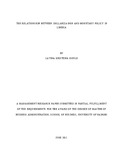| dc.description.abstract | Dollarization denotes the use of a foreign currency in any of its three functions: unit of account means of exchange and store of value. In terms of the latter aspect, dollarization has been increasing in many countries including Liberia, the Philippines, amongst others.
Empirical tests that confirm the significance of dollarization are generally flawed but what is more important is to determine the impact of dollarization on the efficacy of monetary policy and the choice of exchange rate regime. Full dollarization or official dollarization has both its costs and benefits but this is not a viable option for many countries. Dollarization can occur in two ways. In de facto dollarization, or “currency substitution,” the dollar or hard currency is used in private transactions as a unit of account, as a medium of exchange, and as a store of value), but is not legal tender.
Another path to dollarization occurs when a foreign government makes a conscious decision to re-place its own currency with the U.S. dollar. In official dollarization, the hard currency becomes legal tender for at least one of these purposes, but not necessarily exclusively. In full dollarization, the dollar is the only legal tender and the country's own national currency ceases to exist. This is the case in Panama, Micronesia, East Timor, an others. In a country with limited dollarization, this policy shift can take the form of allowing residents to hold dollar-denominated accounts. For example, in Argentina, whose currency board pegs the currency to the dollar by law, banks offer dollar accounts and dollars circulate freely alongside the peso. | en |

